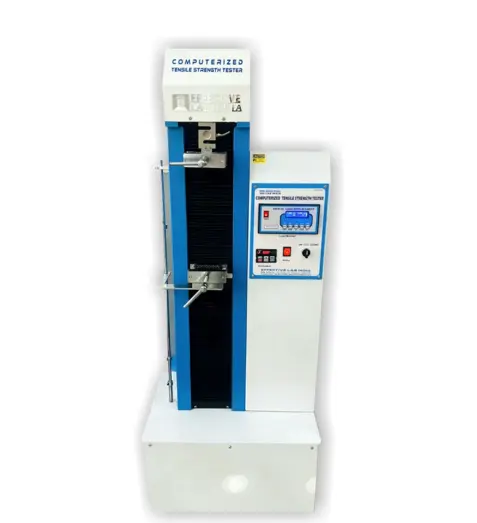
Tensile Testing Machines - Digital
Read more
As per their working process first applying a controlled tensile force to the metal by the machine until it breaks or destroy and then digitally recording the tensile forces at which the material breaks.
Whether you are in the construction, automotive, aerospace, or manufacturing sector, understanding how to use and benefit from this machine will enhance your product quality and reliability.
What is the Working Process of a Tensile Strength Tester?
A tensile testing machine works by clamping a material sample between two grips. During this mechanism, one grip remains stationary while the other is being pulled away steadily.
In this work, a Tensile force is applied to the material as the grip pulls on it while causing it to stretch until it breaks. The device calculates the corresponding elongation and force used in the material. Moreover, tensile strength, yield strength and other mechanical characteristics of a material are computed by using this data. This process of tensile testing machines helps in the understanding of the behaviour of various materials under tension by researchers and engineers.
How to Use the Tensile Testing Machine?
Tensile Testing Machine is a unique material testing method designed to test the tensile strength and ductility of materials. This machine is designed for various substances ranging from metals and plastics to fibers and paper. The main function of this tensile testing machine is to determine the strength of the material in which the machine applies a tensile force to the sample until it breaks. This test is ideal for quality control, material selection and research purposes.
Using a tensile testing machine involves a series of steps to measure the tensile strength and mechanical properties of a material.
Step by Step Guideline on How to use a Tensile Testing Machine:
Here we will explain about Tensile Testing Machine (also known as Universal Testing Machine (UTM)) step by step guide on how they are commonly used to determine tensile strength, elongation of various material properties.
Preparation Stage:
First, we have to understand about the preparation of the purpose of tensile testing strength properties in which we have to define the testing material like tensile strength, yield strength, elongation etc. After that we can select the appropriate sample guideline standard of each material like ASTM D638 for plastics, ASTM E8 for metals, etc. We can select the material to be tested on that the machine is calibrated and ready for testing in working condition for testing also ensure that the grips and fixtures are suitable for the material and size of the sample After that prepare the sample and wear suitable safety equipment like goggles, gloves for safety purposes and also ensure that the emergency stop button is functional We have to keep away from loose clothes/hair while working on this sample.
Post-Test Stage:
After testing the samples, stop the testing machine and take out the samples. Then the tensile testing samples are tested by the tensile testing machine in which we lift the grip and carefully remove the material of the broken samples and record the tensile data, i.e., the maximum force applied by the machine at which the specimen broke as the machine usually stops automatically when the sample breaks or at predetermined conditions.
Testing Stage:
In this testing procedure we start the testing machine then the tensile testing machine and its related computer interface software is started after that the samples are installed and the grips are opened and the samples are placed in the upper and lower grips and then the grips are securely tightened to prevent slipping. After all successful procedure configure the test parameters and set the parameters in the software and zero the gauge length maximum load or elongation limit, data acquisition rate, load and extension. During this testing procedure the load cell, extension or displacement readings are set to zero. After that the material samples are tested and the tensile test is measured for the material samples using the control software and the load and elongation are also monitored in real time and the test is inspected and the samples are also checked for breakage or failure of the material samples because in most of the cases the machine usually stops automatically after breakage or failure of the material samples.
Here are some of the key global standard test methods that define how to prepare, test, and analyze accurate tensile specimens while ensuring industry-wide compatibility:
ASTM D638: This standard test method is used for testing the tensile properties of plastics
ASTM E8: This standard test method is used for testing the tensile properties of Metallic Materials
ISO 527: This standard test method is used for testing the tensile properties of Plastics
ISO 6892 – Metallic materails - Tensile Testing
Deep Details of Tensile Strength Tester Manufacturer and Price
Effective Lab India is one of the top manufacturers of Tensile Strength Testers in India. Our company is recognised for providing and supplying Tensile Strength Testers (Digital Model) to clients who are interested in measuring the tensile strength of their materials. This tester works on the basis of the constant rate of traverse principle, thereby providing accurate tensile results to the user. You can use this Digital Tensile Testing Machine to establish the tensile strength of your important materials, such as fabric, rubber, elastomers, plastics, paper, wire, rubber, cable, board, metal, etc. In our equipment, you get a microprocessor-based load indicator and it comes with some special features like overload protection, peak hold and automatic calibration. Our machine is available in both digital and computerised models. The user can choose any model as per their convenience. The price rate of the Tensile Testing Machine Computerised (Crimp Thimble Grip) offered by us is very competitive as per the budget, as compared to others, whose starting price rate in the Indian market is from Rs. 48000 to Rs. 260000.
| Display | Graphical with test data output through Inbuilt Software |
| Power | 220V, Single / Three phase, 50 Hz |
| Accuracy | ± 2% at Full Load (with master load) |
| Standard Speed | 50-500 mm/min *Optional through computer software |
| Grip to Grip Separation | Min 25mm and Max. 700mm (applicable only with vice type standard grip) |
| Digital load indicator | 7 segment LED Display (optional as per request) |
| Drive Mechanism | Variable Frequency AC Drive |
| Safety | Yes |
| Grippers (optional added based on requirement) | Vice Type (Standard Gripper), Flexural Compression Plate, Wedge Type, Roller Type |
| Communication Converter | USB / RS 485 |
| Material | Mild Steel |
| Finish | Powder coated Havel Gray & Blue combination finish and bright chrome / zinc plating for corrosion resistant finish |
| Dimensions | 1125 x 650 x 1550 mm (as per load cell range) |
- Advanced load sensor sensing through advanced electronics.
• Speed Control through Variable Frequency drive automation by Graphic user interface PC.
• Highly sensitive load sensor with linearity feature and repeatability
• Cross-head travel length: 800 mm without grips
• Twin column rugged structure
• Safety limit switches for over travel safety
• Hardened lead screws/ball screws for frictionless movement
• Load cell calibrated by NABL approved proving ring/dynamometers
• Advanced Navigation System
• High accurate micro-controller based system controls with integrated software
• User Friendly software with intuitive icons and robust architecture
• Inbuilt hardware/software CD
• Easy Data Management. User programmable product identification, lot no., shape of specimen, company name, operator
details etc.
• USB compatible for high speed data transfer
• Export Test report in excel format
• Print preview of test reports with Zoom Feature available
• Online test run status can be viewed graphically or in raw data form
• Secured working with key protection feature
• Ease of use features: Graph setup, test control wizard, formulae/result calculations, reports, live test panel.
• Graph setup: user defined graph scale/range with Graph Title
• Test Control Wizard to set test parameters like tension, compression, changeable units in Kgs/N/lbs or cm/mm/inch.
• Automatic end test/return to home position through software interface after completion of test.
• Immediate analysis of results after test with complete accuracy & precision.
• Option to email test reports
• Single Test start with one click entry of the mouse.
Know About Our Products
A Tensile Testing Machine Digital is a highly specialized device designed to test the tensile strength and mechanical properties of various materials, such as metals, plastics, textiles, and composites. It provides precise, real-time data on how materials behave under tension, which is crucial for manufacturers and researchers in ensuring the quality, durability, and performance of products.
Tensile tests are performed on a universal testing machine commonly known as Tensile strength testing equipment.
Tor Steel, mild steel and high tensile steel are used in tensile strength testing machines for tensile tests.
Tensile testing is important for determining the durability and strength of various materials such as metals, textiles and polymers. Tensile testing provides a new opportunity to discover new alloys, their uses and their qualities in the metal industry.
The speed of tensile testing for measuring strength and elongation is 5 or 50 mm/min, and for measuring modulus is 1 mm/min.



Contact Form
Connect with us will help you with their queries...
For accurate laboratory testing results? contact us
for high-quality testing equipment solutions.
